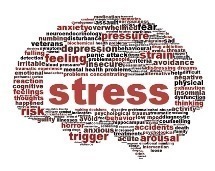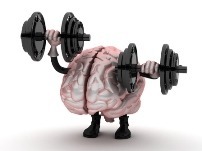Excerpts
 These days, we all live under considerable stress — economic challenges, job demands, family tensions, always-on technology and the 24-hour news cycle all contribute to ceaseless worry. While many have learned to simply “live with it,” this ongoing stress can, unless properly managed, have a serious negative impact on our ability to think clearly and make good decisions, in the short-term, and may even harm our brains in the long-term.
These days, we all live under considerable stress — economic challenges, job demands, family tensions, always-on technology and the 24-hour news cycle all contribute to ceaseless worry. While many have learned to simply “live with it,” this ongoing stress can, unless properly managed, have a serious negative impact on our ability to think clearly and make good decisions, in the short-term, and may even harm our brains in the long-term.
Recent studies show that chronic stress can also lead to depression, and even to a higher risk of cognitive decline and Alzheimer’s disease symptoms. Why? Under stress, the brain’s limbic system — responsible for emotions, memory and learning — triggers an alarm that activates the fight-or-flight response, increasing the production of adrenaline and cortisol, which work together to speed heart rate, increase metabolism and blood pressure, and lower pain sensitivity — all good things when your very survival is on the line. When the stressful situation is over, the body should reset back to normal.
However, under sustained stress, the body is unable to reset. High adrenaline and cortisol levels persist, potentially causing blood pressure problems, and blocking the formation of new neural connections in the hippocampus, the part of the brain responsible for encoding new memories. When these new connections are blocked, the hippocampus can actually shrink in size, hindering memory…
What can you do?
Rather than simply living with stress, learning how to effectively master our stress levels and build emotional resilience can not only help you feel and perform better on a daily basis, but also protect your brain from the long-term damaging effects of stress. Here’s how to do it: Keep reading excerpt on “6 tips to build resilience and prevent brain-damaging stress.”
—
 How is brain training different from mental stimulation?
How is brain training different from mental stimulation?
Anything we do involving novelty, variety, and challenge stimulates the brain and can contribute to building capacity and brain reserve. For instance, learning how to play the piano activates a number of brain functions (attention, memory, motor skills, etc.), which triggers changes in the underlying neuronal networks. Indeed, musicians have larger brain volume in areas that are important for playing an instrument: motor, auditory and visuospatial regions. However, we need to recognize that such an activity may take thousands of hours before paying off in terms of brain fitness. It constitutes a great and pleasurable mental effort, and helps build cognitive reserve, but it is different by nature from more targeted, efficient, and complementary brain training interventions. To take an analogy from the world of physical fitness, it makes sense to stay fit by playing pickup soccer games and also by training specific muscle groups and capacities such as cardio endurance, abdominal muscles, and thigh muscle. It is not one or the other.
Under what conditions can brain training work?
This is the million dollar question. Evidence is growing that brain training can work. The question remains, however, how to maximize the likelihood of transfer from training to daily life.
Why do we still often hear that brain training does not work? Because of the different understandings of what “brain training” and “work” mean. A machine to train abdominal muscles probably won’t “work” if what we measure is blood pressure. A “plane” won’t fly if it wasn’t a plane to start with, but a donkey.
The most critical factor in determining whether a brain training method or program works is the extent to which the training effects “transfer” to benefits in daily life. We know from common experience that practice usually triggers improvement in the practiced task. Based on our analysis of documented examples of brain training techniques that “work” or “transfer,” we propose that these five conditions must be met for any kind of brain training, from meditation to technology-based programs, to translate into meaningful real world improvements: Keep reading excerpt on “Does brain training work? Yes, if it meets these five conditions.”
